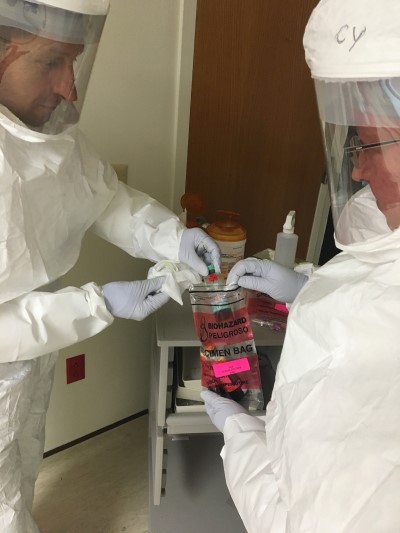Worker Training Program

NIEHS WTP supports the development and implementation of training programs to prevent occupational exposure to infectious agents that cause diseases like COVID-19 and Ebola. These training programs target workers in a variety of occupations, including workers who face risk of exposure to infectious and biological hazards due to their jobs and assigned tasks, those who have frequent or close contact with the general public, and those with minimal occupational exposure but may have an ongoing risk in their community.
These training programs aim to:
- Provide workers with the skills and knowledge to protect themselves and their communities from potential exposure.
- Increase organizational awareness and capacity to minimize exposure.
- Develop tools, resources, curricula, and training approaches to reduce occupational exposure.
- Develop a coordinated approach for infection prevention and occupational health among workers at various levels and facilities.
- Promote and establish national, regional, and multistate partnerships to provide training or training support in occupational settings that face the risk of exposure to infectious agents.
WTP funded organizations, known as award recipients, are well-suited to deliver training and implement infectious disease safety, preparedness, and response efforts. Award recipients have provided infectious disease training to workers during the anthrax attacks (2001), the H5N1 outbreak (2007), and the H1N1 avian influenza outbreak (2009). WTP award recipients also delivered mold remediation training following many major U.S. hurricanes such as Katrina (2005) and Sandy (2012), Ebola virus disease preparedness training (2013-2015), and training during the COVID-19 pandemic (starting in 2020).
This work continues through all of WTP’s training program areas, with award recipients delivering stand-alone infectious disease and biological hazards training courses or integrating content into their hazardous materials and hazardous waste curricula.
COVID-19 Awareness and Response Training
In response to the COVID-19 pandemic, WTP funded award recipients provide infection control and health and safety training and develop resources such as curricula, technical briefs, and webinars. Award recipients continue to address COVID-19-related workplace hazards in ongoing training programs as part of an all-hazards approach to health and safety training. WTP’s response was greatly enhanced by funding from the Coronavirus Preparedness and Response Supplemental Appropriations Act, 2020. Read more about WTP’s COVID-19 response and activities in the WTP COVID-19 Accomplishments Report (2MB).
The curriculum “Building Programs to Protect Workers from COVID-19 in the Workplace,” provides a thorough overview for workers on how to prevent potential exposure to SARS-CoV-2, the virus that causes COVID-19. Technical Briefs, such as those on vaccines and variants, offer additional information on current issues in the pandemic. Find more resources on COVID-19 Training Tool and Resources , many available in English and Spanish, and read about the evaluation of WTP COVID-19 Evaluation Summary Report (2MB).
Ebola Awareness and Response Training
Between 2017 and 2020, WTP administered the Ebola Biosafety and Infectious Disease Response Worker Training Program to build federal capacity for biosecurity, biopreparedness, and rapid response to emerging infectious diseases, including developing an infrastructure of trainers and organizations who can be a resource during emergencies. The program was developed in collaboration with the Centers for Disease Control and Prevention, the U.S. Department of Health and Human Services Office of the Assistant Secretary for Preparedness and Response, the Occupational Safety and Health Administration, and the National Institute for Occupational Safety and Health.
Read more about the accomplishments of the Ebola Biosafety and Infectious Disease Response Worker Training Program in its Full Report.


